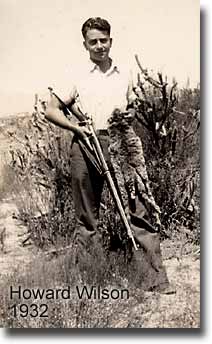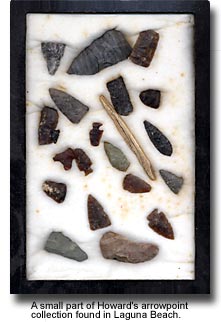|
It was a hot, sunny day in Laguna Beach California in 1933,
when 17 year old Howard Wilson showed up at his pal Ed Marriner's
house to talk to him about something that he had been thinking
about lately. Howard had plans for a great adventure that day.
 Howard and Ed often spent time together, roaming over the empty
Laguna landscape searching for local Indian artifacts. They
both had been well schooled in the lay of this rugged land,
the coastal bluffs, it's rivers, hills and canyons. They both
had spent most of their youth scrambling amongst the hidden
treasures of this unique coastal environment, and they loved
it deeply. They shared a common interest in the history of the
area, and especially the living history of the inhabitants that
were living here before the Spanish "discovered" them
in the late 1500's.
Howard and Ed often spent time together, roaming over the empty
Laguna landscape searching for local Indian artifacts. They
both had been well schooled in the lay of this rugged land,
the coastal bluffs, it's rivers, hills and canyons. They both
had spent most of their youth scrambling amongst the hidden
treasures of this unique coastal environment, and they loved
it deeply. They shared a common interest in the history of the
area, and especially the living history of the inhabitants that
were living here before the Spanish "discovered" them
in the late 1500's.
They also knew exactly where to look amongst the cliff tops
and fields of coastal Laguna for places the Indians lived and
worked. Indian village sites were scattered everywhere along
the coast and easy to find - if you knew where to look. The
patches of rich black soil filled with small bits of chipped
and burned rock, mixed in with seashells by the thousands, that
told them this was the living floor or "midden" of
a vanished people who once populated the coast.
The makers of these middens, were a semi-nomadic group of desert
culture people that had come into the Southern California area
around 3,000 years ago, displacing the older "Oak Grove"
people, who were here before them by nearly another 3,000 years
earlier. Little is known of these earlier "Oak Grove"
people from that ancient time, but a great deal is known of
the more recent folk.
Coming from the harsh deserts of the Southwest, they had brought
with them the tools and traditions of a nomadic people who had
learned to fashion their lives around the constant need to migrate
in the never ending hunt for food. When they arrived at the
coast they continued their ancient habits after a fashion, but
only between the oak tree filled mountains with their plentiful
acorn supply, and the coast with it's unlimited supply of fish,
clams, abalone and small game. Life was so good and so easy
compared to the desert, that they kept their tools and culture
little different from what they already knew. Apparently they
felt little need to improve their circumstances - it was near
perfect as it was.
When the Spanish missions were established, these unfortunate
and gentle people were rounded up and named after the missions
to which they were sent. The Laguna people were split in two
groups. Those north of Aliso Canyon were sent to Mission San
Gabriel and called the "Gabrielinos", while those
to the south of Aliso were sent to San Juan Capistrano Mission
and became the "Juanenos".
 Howard
had already amassed a sizable collection of stone tools, arrowpoints,
carved shells, and cooking utensils left behind by these now
vanished peoples, but that was not their goal today. He had
bigger, more exciting plans for today's adventure. Today they
were going to look for something new. Something entirely different. Howard
had already amassed a sizable collection of stone tools, arrowpoints,
carved shells, and cooking utensils left behind by these now
vanished peoples, but that was not their goal today. He had
bigger, more exciting plans for today's adventure. Today they
were going to look for something new. Something entirely different.
They went looking for a rumor...
The rumor was that a few years earlier some workmen were digging
the foundation for a new house on St. Anns Drive when they found
some skeletal remains...a few old skulls...that looked like
humans. The workers supposedly crushed them up and tossed them
into the cement mix for the slab and continued working. Howard
figured that if it were true, there might be other remains still
to be found in the area, and it would be a perfect way to spend
a sunny summer day with his adventure buddy Ed.
The boys set off with the the typical high hopes of youth,
thinking that finding a an old bone would be quite a thrill,
little knowing that even their wildest dreams of discovery
would not match what they were about to do...
They were about to meet the first American!
|